Unit 2 News media
- 格式:doc
- 大小:56.50 KB
- 文档页数:9
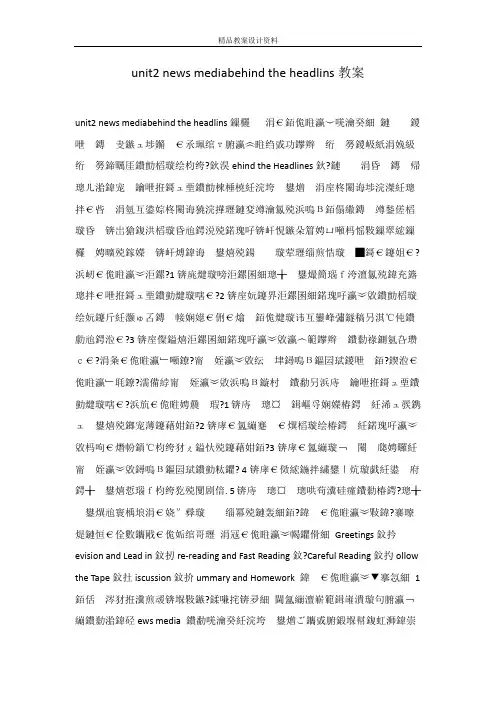
unit2 news mediabehind the headlins教案unit2 news mediabehind the headlins涓€銆佹暀瀛﹀唴瀹癸細т?鈥淏ehind the Headlines鈥?В?浜屻€佹暀瀛︾洰鏍?1璁拌€呭拰鎶ュ垔鐨勭煡璇嗐€?2锛庢妧鑳界洰鏍囷細鍩瑰吇瀛︾敓鐨勯槄璇勮兘鍔涖€?3c€?涓夈€佹暀瀛﹂噸鐐?В?鍥涖€佹暀瀛﹂毦鐐?В勭煡璇嗐€??1?2敓杩呴€熸帉鎻℃枃绔犲ぇ鎰忕殑鑳藉姏銆?3В鏂囩珷鐨勭粏鑺? 4偣. 5?璁╁??褰曢煶鏈恒€佺數鑴戙€佹姤绾哥瓑涓冦€佹暀瀛︾幆鑺傦細Greetings鈫扲evision and Lead in鈫扨re-reading and Fast Reading鈫?Careful Reading鈫扚ollow the Tape鈫扗iscussion鈫扴ummary and Homework 1?鍒嗛挓锛夛細閫氳繃澶嶄範鍓嶉潰璇句腑瀛﹁繃鐨勬湁鍏硁ews mediaThere are several kinds of news media, right? Can you tell me what they are? Which of them do you think is more convenient and cheaper? Do you agree that newspapers are more convenient and cheaper? And which kinds of newspapers do you often read?鐫€鍙堥€氳繃In a newspaper, what do we call this, the heading printed in large letters? Who write the news we read in these newspapers? And how is the news made and written??2蹇7鍒嗛挓锛夛細pre-reading?2鍒嗛挓锛屾壘鍑烘枃绔犲疄闄呬笂璋堝強浜唒re-readingф剰鐨勮兘鍔涖€?3?8鍒嗛挓锛?鐢熼粯璇?橈紙鈶?Do newspapers and other media simply record what happens? What do experienced editors and reporters do锛熲憽Who were asked to be interviewed to tell us more about news and newspapers?3?What is the editor鈥檚job?鈶?Is interviewing someone difficult? What must a reporter know?鈶?Which article isChen Ying鈥檚favorite one?鈶?What would Zhu Lin like to write about?鈶?What is the basic task for a reporter??鍒嗛挓锛屽?What is the topic sentence of the last paragraph?鈶?What result can TV programmes and printed articles bring to us?锛夈€傛瘡涓€閮ㄥ垎鍦ㄦ牎瀵圭瓟妗堟椂锛屾敞鎰忚В閲婃煇浜涢噸闅剧偣鍜岄毦鍙ワ紝?4銆佽窡璇诲綍闊冲甫锛堢敤鏃?鍒嗛挓锛?犳繁瀵规枃绔犵殑鐞嗚В銆?510鍒嗛挓锛?缁曢棶棰業f you were a reporter, what would you like to write about? Why?涓庡悓瀛恵Example: Mary: Hi, Bill. If you were a reporter, what do you want to write about? Bill: Oh, I want to write about animals. Mary: Really? Why? Bill: Because lots of animals are in danger. They are dying. How about you?鈥?Mary:?6銆佸皬缁撳苟甯冪疆浣滀笟锛堢敤鏃?鍒嗛挓锛??Behind the Headlines news media headline radio the headlines magazines journalists or reporters newspapers more than a website informed TV programmes relate to convenient on all sides cheaper tolerateUnit2 News Media Behind the HeadlinesTeaching Aims: 1. Get the students to learn more about reporters and newspapers. 2. Develop the students鈥?reading ability. 3. Understand the passage exactly. Teaching Methods: fast reading; careful reading; individual and pair work Teaching Aids: a recorder; a projector; newspapers Time: 45 minutes Teaching Procedures: Step1: Greetings Step2: Revision and Lead in (5mins) 1. Revise what was talked about newsmedia in the last lesson 2. Lead in to the new passage T: Well, you鈥檝e learned something about news media. There are several kinds of news media, right? Can you tell me what they are? (Ss respond) Yeah, radio, TV programmes, magazines, newspapers, a website, and so on. T: Good! All these news media help us learn about the world around us. Which of then do you think is more convenient and cheaper? (Ss respond) Do you agree that newspapers are more convenient and cheaper? We and just put a newspaper in our bag and take it everywhere,; we can read it when waiting for a bus鈥?Ss respond) T: And which kinds of newspapers do you often read? (Ss respond.) The People鈥檚Daily, The Chinese Youth Daily, Guangzhou Daily, and so on. T: Now, look at this! In a newspaper, what do we call this, the heading printed in large letters? (Ss respond) Right! We call it a headline. And the headlines refer to the news or the main points of news. And who write the news we read in these newspapers? (Ss respond.) Yeah, very good! Journalists or reporters. And how is the news made and written? Anyone who knows? Nobody? Well, it doesn鈥檛matter. Today, we will learn a new passage about reporters and newspapers. Two of China鈥檚many talented journalists were asked to help us know about their work and how the news is made and written. Step 3: Pre-reading and fast reading (7 mins) 1. Ss guess the questions in the pre-reading from the title and the three pictures. 2. Ss read the text quickly to see whether they have guessed the right answer. T: OK, turn to Page11. Let鈥檚come to the new lesson 鈥淏ehind the Headlines鈥? In the pre-reading, there are six questions, see it? Now, look at the title of the passage and the three pictures Try to guess which of the above six questions the text will answer. You can discuss with your partner. A minute for you. (A minute later.) T: Stop discussing, please! What is your opinion? (S1 responds.) Different opinions? (S2 responds.) Thanks for your opinions! T: All right! Now please read the text quickly and find out the right answer. Let鈥檚see whether you have guessed it right or not.I will give you tow minutes. Just glance over the text and get the main idea, you don鈥檛need to understand every word of it. (Two minutes later.) T: OK, stop here! Have you find the right answer? (Ss respond.) Right, the first one and the last one.鈥淗ow does a reporter decide what to write?鈥?鈥淗ow de newspapers help us understand the world?鈥?Step4: Careful Reading (18 mins) 1. Ss divide the text into three parts. 2. Ss read the first part and answer two questions. 3. Ss read the second part and answer five questions.. 4. Ss read the last part and answer two questions. T: Look at the text again. How many parts can we divide it into? (Ss respond.) Yeah, three parts. The 1st part is the 1st paragraph, the 3rd part is the last paragraph, and those paragraphs in the middle belong to the 2nd part. T: Now, read the 1st part and answer the two questions on the screen. I will give you one minute. 鈶燚o newspapers and other media simply record what happens? What do experienced editors and reporters do? ho were asked to be interviewed to tell us more about news and newspapers? (A minute later, check the answers and explain some of the difficult points: 鈥渕ore than鈥? 鈥渕ake informed decisions鈥? 鈥渞elate to鈥?) T: OK, now read the 2nd part and answer the above five questions. Three minutes for you. 鈶?What is the editor鈥檚job? 鈶?Is interviewing someone difficult? What must a reporter know? 鈶?Which article is Chen Ying鈥檚favourite one? 鈶?What would Zhu Lin like to write about? 鈶?What is the basic task for a reporter?(Three minutes later, check the answers and explain some of the difficult points: 鈥渟piritual fulfillment鈥? 鈥渢ruthfully鈥?) T: Well done! Now read the last part and answer two more questions. I will give a minute. 鈶?What is the topic sentence of the last paragraph? 鈶?What result can TV programmes and printed articles bring to us? (A minute later, check the answers and explain the last sentence of the last paragraph.) Step5 Follow the Tape (4 mins) T: OK, so much for the questions. Now, I will play the tape, Try to follow it and read aloud. (Ss follow the tape.) Step6: Discussion (10 mins) 1.Explain the task to the Ss and give them an example. 2.Ssdiscuss about the given topic and make a dialogue with their partners. 3.Ss show their dialogues. T: Well, in the text, Zhu Lin says that he would like to write about music, art, nature and the importance of spiritual fulfillment, because he want to explore the mysteries in life. If I were a reporter, maybe I would like to write about love stories, because true love is very moving. How about you? If you were a reporter, what would you like to write about? And why? Now discuss this question with your partner and then make a dialogue. Here is an example for you. Discussion If you were a reporter, what would you like to write about? Why? Example: Mary: Hi, Bill. If you were a reporter, what do you want to write about? Bill: Oh, I want to write about animals. Mary: Really? Why? Bill: Because lots of animals are in danger. They are dying. How about you?鈥?Mary: 鈥?T: Think of what you would like to write about and tell your partner the reason in detail. I will give you three minutes. Clear? Begin now! (Three minutes later.) T: OK, time is limited. Are you ready? Who would like to show us the dialogue? You two, please! ( Ss act. ) T: Wonderful! Thanks very much! Ok, so much for the discussion. You can discuss more after class. Step7 Summary and Homework ( 1min ) Sum up what has been learnt in this period and assign the homework. T: Now, let鈥檚look at what we鈥檝e learnt in this period. From the passage 鈥淏ehind the Headlines鈥? we鈥檝e learnt more about reporters and newspapers. I believe some of you may become famous reporters in the future. T: Homework for today! Review what we learnt today and recite the first paragraph. So much for today! Goodbye, class!。
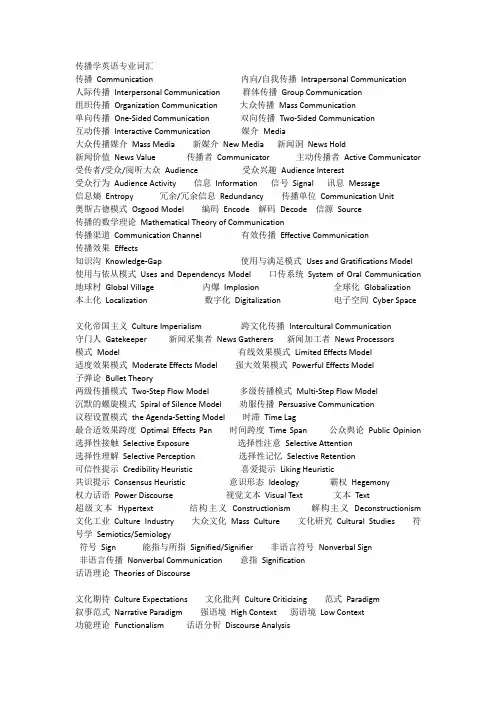
传播学英语专业词汇传播Communication 内向/自我传播Intrapersonal Communication人际传播Interpersonal Communication 群体传播Group Communication组织传播Organization Communication 大众传播Mass Communication单向传播One-Sided Communication 双向传播Two-Sided Communication互动传播Interactive Communication 媒介Media大众传播媒介Mass Media 新媒介New Media 新闻洞News Hold新闻价值News Value 传播者Communicator 主动传播者Active Communicator 受传者/受众/阅听大众Audience 受众兴趣Audience Interest受众行为Audience Activity 信息Information 信号Signal 讯息Message信息熵Entropy 冗余/冗余信息Redundancy 传播单位Communication Unit奥斯古德模式Osgood Model 编码Encode 解码Decode 信源Source传播的数学理论Mathematical Theory of Communication传播渠道Communication Channel 有效传播Effective Communication传播效果Effects知识沟Knowledge-Gap 使用与满足模式Uses and Gratifications Model使用与依从模式Uses and Dependencys Model 口传系统System of Oral Communication 地球村Global Village 内爆Implosion 全球化Globalization本土化Localization 数字化Digitalization 电子空间Cyber Space文化帝国主义Culture Imperialism 跨文化传播Intercultural Communication守门人Gatekeeper 新闻采集者News Gatherers 新闻加工者News Processors模式Model 有线效果模式Limited Effects Model适度效果模式Moderate Effects Model 强大效果模式Powerful Effects Model子弹论Bullet Theory两级传播模式Two-Step Flow Model 多级传播模式Multi-Step Flow Model沉默的螺旋模式Spiral of Silence Model 劝服传播Persuasive Communication议程设置模式the Agenda-Setting Model 时滞Time Lag最合适效果跨度Optimal Effects Pan 时间跨度Time Span 公众舆论Public Opinion 选择性接触Selective Exposure 选择性注意Selective Attention选择性理解Selective Perception 选择性记忆Selective Retention可信性提示Credibility Heuristic 喜爱提示Liking Heuristic共识提示Consensus Heuristic 意识形态Ideology 霸权Hegemony权力话语Power Discourse 视觉文本Visual Text 文本Text超级文本Hypertext 结构主义Constructionism 解构主义Deconstructionism 文化工业Culture Industry 大众文化Mass Culture 文化研究Cultural Studies 符号学Semiotics/Semiology符号Sign 能指与所指Signified/Signifier 非语言符号Nonverbal Sign非语言传播Nonverbal Communication 意指Signification话语理论Theories of Discourse文化期待Culture Expectations 文化批判Culture Criticizing 范式Paradigm叙事范式Narrative Paradigm 强语境High Context 弱语境Low Context功能理论Functionalism 话语分析Discourse Analysis传播的商品形式the Commodity Forms of Communication 受众商品Audience Commodity 商品化Commodification 空间化Spatialization结构化Structuration媒介集中化Media Conglomeration 传媒产业Media Industry注意力经济Attention Economy 媒介竞争Media Competition传媒英语专业词汇accredited journalist n. 特派记者advertisement n.广告.advance n.预发消息;预写消息affair n.桃色新闻;绯闻attribution n. 消息出处,消息来源back alley news n. 小道消息back grounding n.新闻背景body n. 新闻正文boil vt.压缩(篇幅) box n. 花边新闻brief n. 简讯bulletin n.新闻简报byline n. 署名文章contribution n.(投给报刊的)稿件;投稿contributor n.投稿人copy desk n.新闻编辑部correspondent n.驻外记者;常驻外埠记者cover vt.采访;采写covert coverage 隐性采访;秘密采访daily n.日报dateline n.新闻电头deadline n.截稿时间dig vt.深入采访;追踪(新闻线索);“挖”(新闻) digest n.文摘。
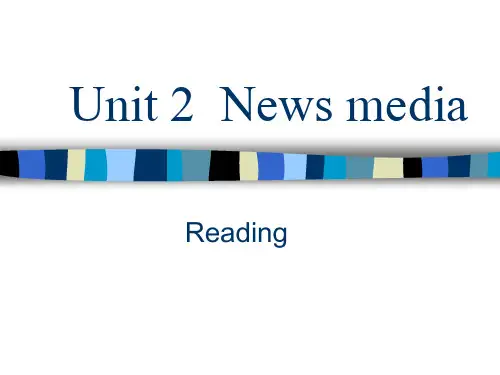
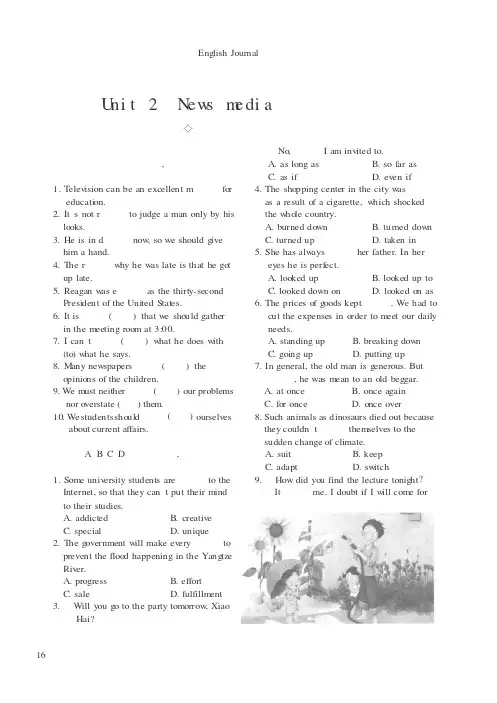
U ni t 2N ew s m e di a课本要点精练一、单词拼写根据句意和汉语提示,写出句中所缺单词的完全形式。
1.T elev ision can be an excellent m fo r education.2.It ’s not r to judge a man only by his lo oks.3.He is in d now ,so we should g ive him a hand.4.T he r w hy he w as late is that he go t up late.5.Reagan w as e as the thirty-second President of the United States.6.It is (告知)that w e sho uld gather in the meeting roo m at 3:00.7.I can ’t (联系)w hat he does w ith (to )w hat he says.8.M any new spapers (反映)the o pinio ns of the children.9.We must neither (忽视)our problems nor o verstate (夸大)them.10.We studentssho uld(关心)ourselv es about current affairs.二、单项填空从A 、B 、C 、D 四个选项中,选出可以填入空白处的最佳选项。
1.Some univ ersity students are to the Internet ,so that they can ’t put their mind to their studies.A.addicted B.creativ e C.special D.unique2.T he g overnment w ill make ev ery to prevent the floo d happening in the Yang tze Riv er.A.progressB.effortC.saleD.fulfillment 3.—Will y ou g o to the party tomorrow ,XiaoHai?—No ,I am inv ited to.A.as long asB.so f ar asC.as ifD.ev en if 4.The sho pping center in the city w asas a result o f a cigarette ,w hich shocked the w ho le country.A.burned do wn B.turned dow n C.turned up D.taken in 5.She has alw ays her father.In her ey es he is perf ect.A.loo ked up B.loo ked up to C.looked down on D.lo oked o n as 6.The prices o f g oods kept .We had to cut the expenses in o rder to meet our daily needs.A.standing upB.breaking dow nC.going upD.putting up 7.In general,the old man is g enerous.But,he was mean to an o ld beg gar.A.at onceB.once againC.fo r onceD.o nce over8.Such animals as dinosaurs died out because they couldn ’t themselves to the sudden change of climate.A.suit B.keep C.adapt D.sw itch9.—How did yo u find the lecture tonig ht ?—It me.I doubt if I w ill come for!河南省潢川第一中学时建贞课堂加油站Eng lish Journal 单元笔记61his lecture next time.A.encouraged B.disappointed C.reflected D.satisfied 10.Things that we ’re facing should beconsidered ,so that we ’ll deal w ith them w ell.A.on all sides B.in order C.around the co rner D.in place 11.The passeng ers w ere robbed alltheir money.A.o f B.o ff C.f rom D.aw ay 12.When she did some shopping in thecro wded sho p,she had her po cket .A.ro bbed B.stolen C.picked D.cheated 13.He felt w hen his friend refused hiskind help.A.hurt B.injured C.harmed D.damaged14.T he parents felt helpless when they foundthat their son had lo ve stories for long.A.addictedB.addicted toC.addicted himselfD.been addicted to 15.He ’s got himself into a dang erous situationhe is likely to lose contro l over theplane.A.where B.w hich C.w hile D.why三、同步语法从A 、B 、C 、D 四个选项中,选出可以填入空白处的最佳选项。
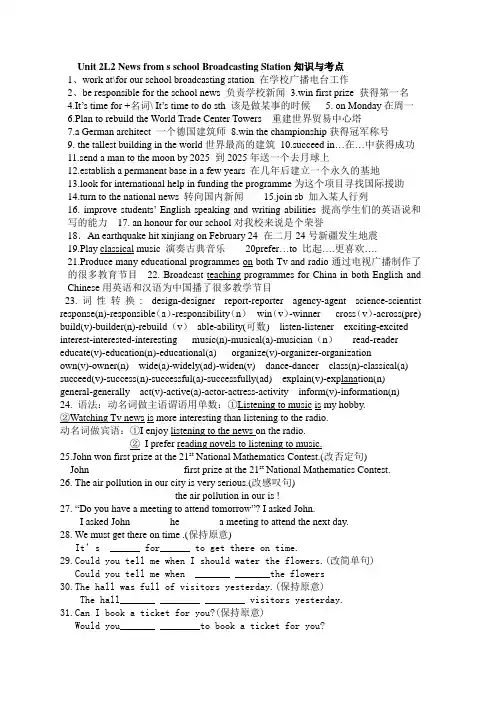
Unit 2L2 News from s school Broadcasting Station知识与考点1、work at\for our school broadcasting station 在学校广播电台工作2、be responsible for the school news 负责学校新闻3.win first prize 获得第一名4.It’s time for +名词\ It’s time to do sth 该是做某事的时候 5. on Monday在周一6.Plan to rebuild the World Trade Center Towers 重建世界贸易中心塔7.a German architect 一个德国建筑师8.win the championship获得冠军称号9. the tallest building in the world世界最高的建筑10.succeed in…在…中获得成功11.send a man to the moon by 2025 到2025年送一个去月球上12.establish a permanent base in a few years 在几年后建立一个永久的基地13.look for international help in funding the programme为这个项目寻找国际援助14.turn to the national news 转向国内新闻15.join sb 加入某人行列16. improve students’English speaking and writing abilities 提高学生们的英语说和写的能力17. an honour for our school对我校来说是个荣誉18.An earthquake hit xinjiang on February 24 在二月24号新疆发生地震19.Play classical music 演奏古典音乐20prefer…to 比起….更喜欢….21.Produce many educational programmes on both Tv and radio通过电视广播制作了的很多教育节目22. Broadcast teaching programmes for China in both English and Chinese用英语和汉语为中国播了很多教学节目23.词性转换: design-designer report-reporter agency-agent science-scientist response(n)-responsible(a)-responsibility(n)win(v)-winner cross(v)-across(pre) build(v)-builder(n)-rebuild(v)able-ability(可数) listen-listener exciting-excited interest-interested-interesting music(n)-musical(a)-musician(n)read-reader educate(v)-education(n)-educational(a) organize(v)-organizer-organizationown(v)-owner(n) wide(a)-widely(ad)-widen(v) dance-dancer class(n)-classical(a) succeed(v)-success(n)-successful(a)-successfully(ad) explain(v)-explanation(n) general-generally act(v)-active(a)-actor-actress-activity inform(v)-information(n)24. 语法:动名词做主语谓语用单数:①Listening to music is my hobby.②Watching Tv news is more interesting than listening to the radio.动名词做宾语:①I enjoy listening to the news on the radio.②I prefer reading novels to listening to music.25.John won first prize at the 21st National Mathematics Contest.(改否定句)John _______ _________ first prize at the 21st National Mathematics Contest.26. The air pollution in our city is very serious.(改感叹句)_________ _________ the air pollution in our is !27. “Do you have a meeting to attend tomorrow”? I asked John.I asked John _______ he _______ a meeting to attend the next day.28. We must get there on time .(保持原意)It’s ______ for______ to get there on time.29.Could you tell me when I should water the flowers.(改简单句)Could you tell me when _______ _______the flowers30.The hall was full of visitors yesterday.(保持原意)The hall_______ ________ ________ visitors yesterday.31.Can I book a ticket for you?(保持原意)Would you_______ ________to book a ticket for you?。
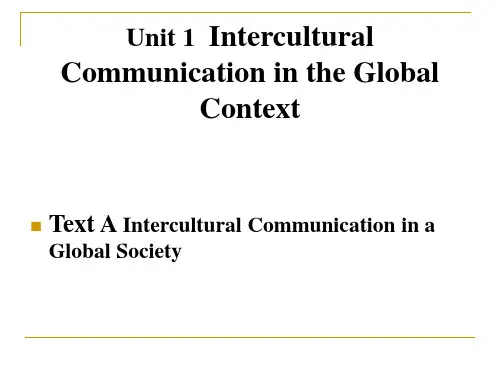
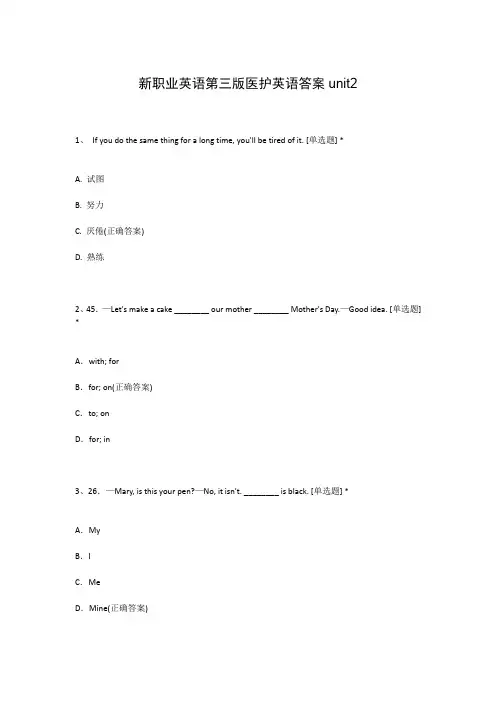
新职业英语第三版医护英语答案unit21、If you do the same thing for a long time, you'll be tired of it. [单选题] *A. 试图B. 努力C. 厌倦(正确答案)D. 熟练2、45.—Let's make a cake ________ our mother ________ Mother's Day.—Good idea. [单选题] *A.with; forB.for; on(正确答案)C.to; onD.for; in3、26.—Mary, is this your pen?—No, it isn't. ________ is black. [单选题] *A.MyB.IC.MeD.Mine(正确答案)4、The car _______ after forty minutes driving, so he didn’t have the interview on time. [单选题] *A. broke down(正确答案)B. broke inC. broke outD. broke up5、The boy’s mother always _______ him a story before he goes to bed. [单选题] *A. saysB. speaksC. tells(正确答案)D. talks6、You can borrow my book, _____ you promise to give it back to me by the end of this month. [单选题] *A.even ifB. as long as(正确答案)C. in caseD. even though7、Your father is very busy, so he ______ play football with you this afternoon.()[单选题] *A. doesn’tB. don’tC. isn’tD. won’t(正确答案)8、73.The moonlight goes ____ the window and makes the room bright. [单选题] * A.acrossB.through(正确答案)C.overD.in9、Sorry, I can't accept your invitation. [单选题] *A. 礼物B. 观点C. 邀请(正确答案)D. 好意10、Many people prefer the bowls made of steel to the _____ made of plastic. [单选题] *A. itB. ones(正确答案)C. oneD. them11、We ______ boating last weekend.()[单选题] *A. goB. went(正确答案)C. are goingD. will go12、The famous writer, _____ writings for China Daily I appreciate a lot , is invited to give a speech in our university. [单选题] *A. thatB. whose(正确答案)C. whomD. who13、The people’s Republic of China _______ on October 1, 1 [单选题] *A. foundB. was founded(正确答案)C. is foundedD. was found14、6.—How can we get to the school?—________ bus. [单选题] * A.ToB.OnC.By(正确答案)D.At15、His remarks _____me that I had made the right decision. [单选题] *A.ensuredB.insuredC.assured(正确答案)D.assumed16、He always ______ the teacher carefully in class. [单选题] *A. listensB. listens to(正确答案)C. hearsD. hears of17、There are trees on both sides of the broad street. [单选题] *B. 狭窄的C. 宽阔的(正确答案)D. 宁静的18、John had planned to leave, but he decided to stay in the hotel for()two days because of the heavy rain. [单选题] *A. otherB. the otherC. another(正确答案)D. others19、28.—Where is Fujian Province?—It’s ________ the southeast of China. [单选题] *A.in (正确答案)B.onC.toD.at20、Jim, it’s dark now. Please _______ the light in the room. [单选题] *A. turn on(正确答案)B. turn upD. turn down21、I’d like to go with you, ______ I’m too busy. [单选题] *A. orB. andC. soD. but(正确答案)22、--Mom, I will not eat fast food this year. Believe me.--If you make a _______, you must keep it. [单选题] *A. jokeB. noiseC. mistakeD. promise(正确答案)23、24.I often ask my English teacher some questions ________ e-mail. [单选题] *A.by(正确答案)B.inC.forD.with24、Henry lives happily with his three cats. _______ of them are part of his family. [单选题] *A. NoneB. BothC. All(正确答案)D. Neither25、_____you may do, you must do it well. [单选题] *A.WhichB.WheneverC.Whatever(正确答案)D.When26、They lost their way in the forest, and _____ made matters worse was night began to fall. [单选题] *A. thatB. itC. what(正确答案)D. which27、Mrs. Green has given us some _______ on how to study English well. [单选题] *A. practiceB. newsC. messagesD. suggestions(正确答案)28、The students _____ outdoors when the visitors arrived. [单选题] *A. were playing(正确答案)B. have playedC. would playD. could play29、We can see ______ stars at night if it doesn’t rain. [单选题] *A. a thousand ofB. thousandsC. thousand ofD. thousands of(正确答案)30、I’d?like _______ the English club. [单选题] *A. to join inB. joinC. to join(正确答案)D. join in。
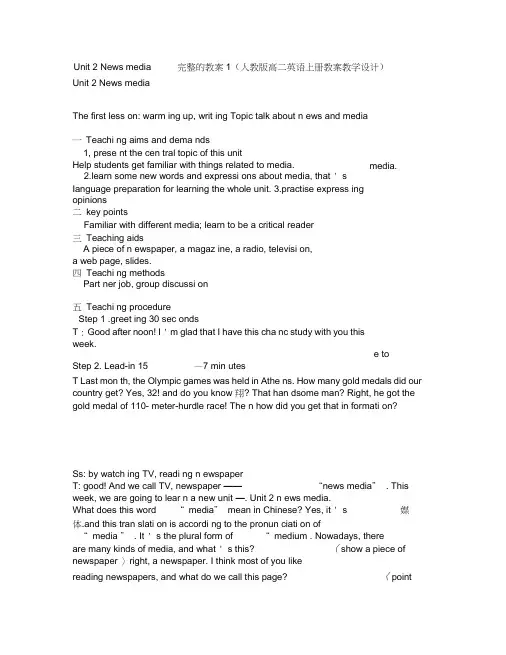
Unit 2 News mediaThe first less on: warm ing up, writ ing Topic talk about n ews and media一 Teachi ng aims and dema nds1, prese nt the cen tral topic of this unitHelp students get familiar with things related to media. 2.learn some new words and expressi ons about media, that ' sIanguage preparation for learning the whole unit. 3.practise express ingopinions二 key pointsFamiliar with different media; learn to be a critical reader三 Teaching aidsA piece of n ewspaper, a magaz ine, a radio, televisi on,a web page, slides.四 Teachi ng methodsPart ner job, group discussi on五 Teachi ng procedureStep 1 .greet ing 30 sec ondsT : Good after noon! I ' m glad that I have this cha nc study with you thisweek.Step 2. Lead-in 15 —7 min utesT Last mon th, the Olympic games was held in Athe ns. How many gold medals did our country get? Yes, 32! and do you know 翔? That han dsome man? Right, he got the gold medal of 110- meter-hurdle race! The n how did you get that in formati on? Ss: by watch ing TV, readi ng n ewspaperT: good! And we call TV, newspaper —— “news media ” . This week, we are going to lear n a new unit —. Unit 2 n ews media.What does this word “ media ” mean in Chinese? Yes, it ' s 媒 体.and this tran slati on is accordi ng to the pronun ciati on of“ media ” . It ' s the plural form of “ medium . Nowadays, thereare many kinds of media, and what ' s this? 〈 show a piece of newspaper 〉right, a newspaper. I think most of you likereading newspapers, and what do we call this page? 〈 pointUnit 2 News media 完整的教案1(人教版高二英语上册教案教学设计) media.e toto the front page 〉yes, it is front page. What about thefirst part of it? Right, it is fron t-page headli ne.Headline is a new word of this unit.lt means 标题。
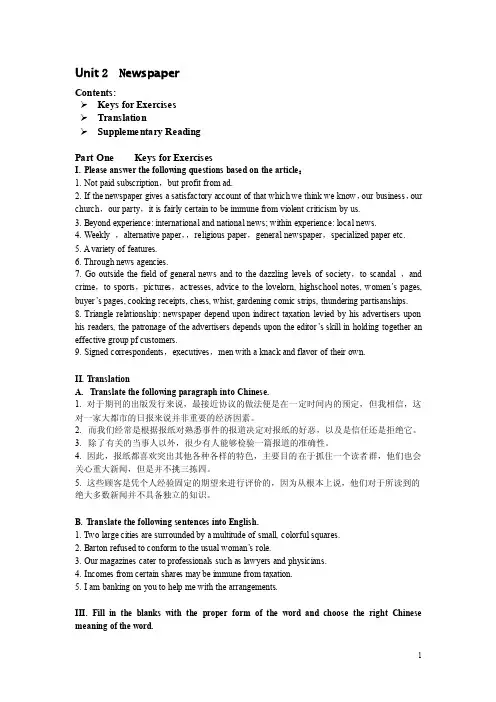
Unit 2N ewspaperContents:Keys for ExercisesTranslationSupplementary ReadingPart One Keys for ExercisesI.Please answer the following questions based on the article:1. Not paid subscription,but profit from ad.2. If the newspaper gives a satisfactory account of that which we think we know,our business,our church,our party,it is fairly certain to be immune from violent criticism by us.3. Beyond experience: international and national news; within experience: local news.4. Weekly ,alternative paper,,religious paper,general newspaper,specialized paper etc.5. A variety of features.6. Through news agencies.7. Go outside the field of general news and to the dazzling levels of society,to scandal ,and crime,to sports,pictures,actresses, advice to the lovelorn, highschool notes, women’s pages, buyer’s pages, cooking receipts, chess, whist, gardening comic strips, thundering partisanships. 8. Triangle relationship: newspaper depend upon indirect taxation levied by his advertisers upon his readers, the patronage of the advertisers depends upon the editor’s skill in holding together an effective group pf customers.9. Signed correspondents,executives,men with a knack and flavor of their own.II. T ranslationA.Translate the following paragraph into Chinese.1. 对于期刊的出版发行来说,最接近协议的做法便是在一定时间内的预定,但我相信,这对一家大都市的日报来说并非重要的经济因素。
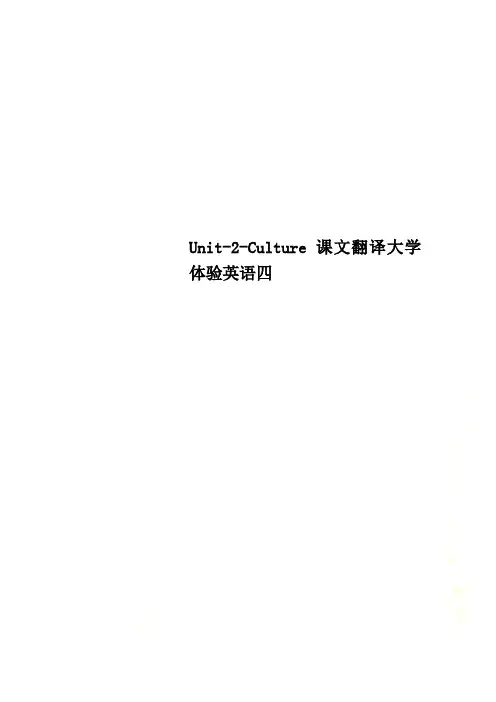
Unit-2-Culture课文翻译大学体验英语四Unit 2 CulturePassage A Why Digital Culture Is Good for You?The news media, along with social and behavioral scientists, have recently sent out a multitude of warnings about the many dangers that await us out there in cyberspace. The truth of the matter is that the Web is no more inherently dangerous than anything else in the world. It is not some amorphous entity capable of inflicting harmful outcomes on all who enter. In fact, in and of itself, the Web is fairly harmless. It has no special power to overtake its users and alter their very existence. Like the old tale that the vampire cannot harm you unless you invite it to cross your threshold, the Internet cannot corrupt without being invited. And, with the exception of children and the weak-willed, it cannot create what does not already exist...(1) Like alcohol, the Web simply magnifies what is already there: Experts are concerned that the masking that goes on online poses a danger for everyone who is a part of the Digital Culture. Before we know it, the experts tell us, we will all use fake identities, become fragmented, and will no longer be sure of just who we are. Wrong. The only people who feel compelled to mask, and otherwise misrepresent themselves online are the same people who are mysterious and unfrank in "real life"...the Net just gives them one more tool to practice their deceit.As for the rest of us, getting taken in by these people is a low probability. We know who these folks are in the "real world". The Internet does not "cause" people to disguise as something they are not. As for the Digital Culture getting cheated by these dishonest folks, well,there are just as many "cues" online to decipher deception as there are in the "real world". The competent WebHead can recognize many red flags given off by the online behavior of others. Oftentimes the intentions of fellow users is crystal clear, especially over time.When someone is trying to deceive us online, inconsistencies, the essence that they are trying "too hard" or are just plain unbelievable, often come through loud and clear. Likewise, just like in the "real world", a host of other unacceptable tendencies can be readily recognized online. Narcissism (it's all about "meeeee"), those people who have nothing but negativity or unpleasant things to say about others, and those who feel compelled to undermine others and who think they must blow out the other guys' candles in order for theirown to shine can be spotted a cybermile away.(2) The Web can bring out the best in people: Gregarious, frank folks in "real life" usually carry these same traits over to their online life. Most are just as fun-loving online if not more so, as they are at a party, at work, or at the local bar. Though admittedly, some are not quite as much fun to be around without a stiff drink.Shy folks have a "safer" environment online than in the "real world" and can learn to express themselves more freely on the Net (you've never seen anyone stutter on e-mail, have you?) allowing them to gain confidence and communication skills that can eventually spill over into other aspects of their lives. Helpful people in "real life" are often just as willing to come to someone's assistance online asanywhere else.(3) People are judged differently on the Web: On the Internet people are judged by their personality, beliefs and online actions, NOT by their physical appearance. This is good. It not only gives ugly folks an aid, but causes Beautiful People to have to say something worth listening to in order to get attention.(4) People open up more: Many people are opening up a whole lot more these days since they are not required to use their real name and provide their real identity in the Internet.(5) We're connected: Members of the Digital Culture know full well that there is a wealth of important information and life-changing opportunities out there in cyberspace. The Web has opened doors for many of us that otherwise would never havebeen an option. Research possibilities and networking are just two such opportunities.(6) We Learn the Power of Words and to be Better Listeners: With no facial expressions, body language, or physical appearance to distract us, members of the Digital Culture have learned the power of words ... both their own, and others'. We know very well how a simple string of words can harm, hurt and offend, or how they can offer humor, help, support and encouragement. Most experienced members of the online culture have learned to become wordsmiths, carefully crafting the words they use to convey exactly what they mean so as not to be misunderstood.Many of us have also learned to become far better listeners thanks to the Internet. Not only do we choose ourwords more carefully but we (especially those who communicate via email as opposed to chat rooms) are forced to wait until the other person finishes before we can speak or respond.A为什么数字文化对你有好处?最近,新闻媒体以及社会学家和行为学家们都发出大量警告指出:网络空间危险重重。
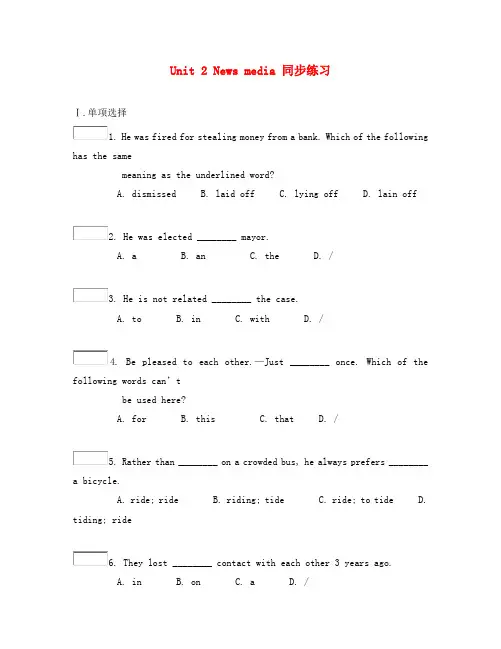
Unit 2 News media 同步练习Ⅰ.单项选择He was fired for stealing money from a bank. Which of the following has the samemeaning as the underlined word?A. dismissedB. laid offC. lying offD. lain offA. aB. anC. theD. /A. toB. inC. withD. /Be pleased to each other.—Just ________ once. Which of the following words can’tbe used here?A. forB. thisC. thatD. /Rather than ________ on a crowded bus, he always prefers ________ a bicycle.A. ride; rideB. riding; tideC. ride; to tideD. tiding; rideA. inB. onC. aD. /players until 1912.A. first playingB. to be first playedC. first playedD. to be first playingonly to people with specificknowledge.A. being knownB. having been knownC. to be knownD. knownMost of the articles ________ to the party were from South Africa.(NMET 1990)A. invitedB. to inviteC. being invitedD. had been invitedThe high building ________ now over there is to be completed next month.A. put upB. to put upC. to be put upD. being put up________ in the hall.A. being heldB. to be heldC. holdD. holdingFrom his ________ look on his face, the price of the meat ________.A. disappointed; has been raisedB. disappointed; has been risenC. disappointing; has raisedD. disappointing; has been raisedⅡ.完形填空When Wilson got to the airport, 1 flight was already being called 2 the loudspeakers. The day before he had given up his 3 for a morning flight and had booked(预定)an afternoon 4 instead. He had to go to the reservations (预定)desk to collect his 5 ticket.He apologized for being 6 .The reservations clerk(预订票的职员)smiled and began to look through the reservations in front of her. Then her 7 disappeared and 8 began to look 9 .“Your ticket doesn’t seem to be here,” she said. “Let me check it with the computer. ”The10 clicked(滴答声)and whirred(飕飕声)and 11 began to flash 12 , his flight was called a second time. Wilson became very 13 . 14 the girl looked 15 .“There’s been a mistake. Your new ticket was sent to you by post. That’s why it isn’t here”, she said. 16 took her only a 17 time to write18 a new one. Wilson managed to catch the plane just before it took 19 . “Whata way to start a 20 !” he thought..A. he B. his C. him D. her.A. up B. with C. over D. out.A. ticket B. wallet C. money D. plane.A. plane B. ticket C. flight D. fight.A. first B. new C. old D. another.A. later B. late C. last D. early.A. smile B. smiling C. smiled D. laugh.A. he B. his C. her D. she.A. happy B. angry C. sad D. worried.A. flight B. loudspeakers C. clerk D. computer.A. lights B. light C. flight D. computer.A. just B. just then C. then D. when.A. angry B. happy C. nervous D. sad.A. Finally B. Last C. Then D. Just.A. at B. down C. up D. out.A. That B. It C. She D. He.A. long B. short C. some D. few.A. down B. out C. away D. of.A. off B. out C. away D. place.A. travel B. work C. job D. holidayⅢ.阅读理解AWe have all heard stories of the architect(建筑师)who forgot to provide stairs or lifts in the building he was designing. There are similar tales of houses designed without any doors. However,many strange buildings canstill be seen. In past centuries,there were hardly any building restrictions (限制),and rich people could build whatever they wanted. Sometimes their ideas were very strange indeed and resulted in silly things, such as a triangular(三角形的)cottage,or a hen-house in the form of a pyramid,or a house built as a windmill(风车). But nowadays there are a great many restrictions,both official and aesthetic(美学的),and the architect must know all of them. The artistic and creative aspects(艺术创造方面)are only a small part of the modern architect’s work. He does not simply design a building and then wait for someone else to build it. He must know all the qualities of the materials he uses,and has to take into consideration heating,lighting,ventilation(通风),insulation(电线安装),drainage (下水道),and many other aspects that never worried the architects in the past..The best title for this passage would be ________.A. The ArchitectB. RestrictionsC. Different ArchitectureD. Modem Architect’s Work.A modem architect ________.A. doesn’t need to know any restrictionsB. needs to know not only restrictions but also qualities of materials as well as someother thingsC. should know more about art and creation than anything elseD. doesn’t simply design a building and then wait for someone else to build it. Hehimself should join in building.The work of an architect in the twentieth century is ________.A. more complicated(复杂的)than that in past centuriesB. much easier than in past centuriesC. less difficult in past centuriesD. less restrict than in past centuries.Now people can’t build whatever they want because of ________.A. restrictionsB. the qualities of the materialsC. the problem of creationD. the problem of design.It seems the architects in past centuries ________.A. were more clever than those nowB. more stupid than those nowC. didn’t have to worry all about the things which worry us nowD. had better taste in architecture than we have todayBAs far back as 700 B. C, man has talked about children being cared for by wolves. Romulus and Remus, the legendary(传说的)twin founders of Rome, were said to have been cared for by wolves. It is believed that when a she-wolf loses her litter, she tries to get human child to take its place. This seemingly foolish and unreasonable idea did not become believable until the late nineteenth century when a French doctor actually found a ten-year-old boy having nothing on wandering in the woods. He didn’t walk upright, could not speak understandably, nor could he relate to people. He only growled (嗥叫)and stared at th em. Finally the doctor won the boy’s confidence and began to work with him. After many long years of devoted and patient teaching, the doctor was able to get the boy to clothe and feed himself, recognize and say a number of words, as well as write letters and form words..The French doctor found the boy ________.A. wandering in the woods B at his doorstepC. growling at himD. speaking understandably.In this passage, the word “litter” in line 3 most nearly means ________.A. garbageB. masterC. hairD. baby animals.The doctor was able to work with the boy because ________.A. the boy had never lost his mindB. the boy trusted himC. the boy liked to dress upD. the boy worked very hard.Which of the following statements is not true?A. She-Wolves have been said to replace human children for their lost litter.B. Examples of wolves caring for human children can be found only in the nineteenthcentury.C. The French doctor succeeded in training the boy to enjoy the human life somewhat.D. The young boy never was able to speak perfectly..In this passage, the word “relate to” most nearly means ________.A. tellB. understandC. listen toD. write to CThe American humoris t, Will Rogers, used to say, “All I know is what I read in the newspapers”. This was an exaggeration for humorous purposes, but it is true that newspapers are an important source of information. Many people begin their day by reading the paper. In this way they learn what is going on in the world. Sometimes, however, they don’t have time to read the news carefully and must be satisfied with a quick look at the front page;at other times they may be in such a hurry that they have time only to glance at the headlines.There are newspapers to satisfy every reader. In the big cities there are many types of papers, with several different editions every day. In small towns there are fewer newspapers and perhaps only one edition each day. In some areas the paper is printed weekly.Most newspapers have several sections, especially on Sundays when the edition is larger than usual. There are, in addition to the front page with the most important news, the sports section, the society page, the comics, the amusement section, a business page, and the editorials.Another type of publication which helps keep the population informed is the magazine. Some magazines are published weekly,others are put out monthly. There are news magazines,literary magazines,and magazines for such special interests as photography, sports,art,and music,Some are primarily for men,others for women,and there is a selection of children’s magazines,too. In the United States,there are publications for every taste and interest..The function of a newspaper is ________.A. to help people to begin their day by reading itB. to satisfy every readerC. to get people well informed of all kinds of newsD. to provide its readers with many sections.The purpose of headlines is ________.A. to show the main idea of an article or a passageB. to tell its readers how to entitle an article or a passageC. a piece of news for people to glance atD. to be printed in large letters above a story in a newspaper.The best title for this passage is ________.A. Newspaper Should Be Reed Every DayB. Different Newspapers Should Be Provided to Satisfy Their ReadersC. Many Types of Newspapers Must Be Published in Big CitiesD. Newspapers and Magazines.When Will Roger said that all he knew was what he read in the newspapers,his realpurpose was ________.A. to tell you that the real source of his knowledge was from the newspaperB. to show that newspapers helped to get him well informedC. to show that he was very learned through reading newspapersD. tell you that he was interested in reading newspapers.Which sentence is the main idea of the 4th paragraph?A. Sentence OneB. Sentence Two C Sentence FourC. Sentence SixD. Sentence FiveDThere are few homes in the United States today that do not have either a radio or television set. Both of them have become an essential part of our daily life, keeping us informed of the news of the day, instructing us in many fields of interest, and entertaining us with singing, dancing and acting.Marconi, the Italian inventor who gave us the radio, probably didn’t realize what effects his great invention would have on the world in the years to come, Radio has, perhaps, had as much influence on the world as any other communications device. Events of universal interest can be reported to theentire globe a few seconds after they happen. Explorers in remote areas, ships at sea, even astronauts circling the earth are able to keep in touch with civilization by means of radio.Television is another major instrument of communication, permitting us to see as well as to hear the performer. Since its appearance, TV has had a tremendous effect on the daily life of people everywhere.Improvements of all kinds are constantly being made in television so that reception will be as close to perfect as possible. Many programs are now televised in color.Perhaps the most recent advancement of significance has been “Telstar. ” This special ly-equipped space capsule, orbiting the globe, makes it possible for the entire world to be closer than ever before. Now a family in Chicago can watch on TV an auto race in Italy, a ski tournament in Norway, or a parade in Japan as these events are actually happening!.The best title of this passage should be ________.A. Most American Homes Have Either Radios Or TV-setsB. The History of Radios and TelevisionsC. Radio and TelevisionD. Learn More about Radios and Televisions.According to this passage, there are / is ________ use(s)of radios and televisions.A. FourB. ThreeC. TwoD. One.A telstar is ________.A. a man-made satellite which moves round a ground TV stationB. a read star which is near to the earthC. a communication satellite by which messages and television are sent from faraway placesD. a sports or movie star who frequently appear in television programs.Which of the following is not true according to the writer of this passage?A. Marconi knew quite well about the great contribution his invention would make to theworld the moment he succeeded in his invention.B. Every American home has either a radio or a TV set.C. A Telstar makes it possible for the whole globe to become closer than ever before.D. Television permits us not only to hear but to see what is going on in the world.Ⅳ.书面表达根据下面对艾略特与赛诺相似之处与区别的提示,以《不同的性格,幸福的一对》(A Happy Couple with Different Characters)为题写一篇两段落的短文。
高二新教材Unit1The first PeriodTeaching Steps:Step1 warming up1.T: There are many outstanding scientists in the world who made great contributions tosociety and science. Now make a list of the names of some scientists and their contributions.Maria curie ------ radioactivityZhang Heng ------ seismographThomas Edison ------ light bulbCharles Darwin-------The Theory of EvolutionAlbert Einstein ------ The Theory of RelativityT: Well done. What do you think makes a successful scientist?(Discussion)B: much imagination , intelligent , creative, hard—working, confident, curious, careful. 2.Look at the pictures in the book. Have the students read he quotes and discuss what thequotes mean in class.3.have the students present more quotes they know about science and thinking.Step2 listening1.Go through the requirements first ,and then listen to the descriptions of some famousscientists to get the main idea.2.play the tape again and finish the exercise.3.check the answers.Step 3.Speaking1.Work in groups of five. Each group member represents a branch of science, and debate eachother to see which branch of science is the most important and useful for society. They should prepare their role cards and then debate each other.2.Ask one group to present their debate in class.Example:S1: I think biology is the most important and useful science because people can not live without living things. If there were no science of biology, there would not be medicine.S2: Well, maybe.But I think chemistry is the most important and useful ,because chemistry is the key to the progress of the human being. Besides, it is chemical reaction that produces many new things.S3: It is hard to say .There are many physical products. And physics is widely used in many fileds, such as medicine, industry and agriculture. There would be no life without physics. So I think physics is the most important and useful for science.S4: That’s true. But maths is the basic science.You can not learn physics or chemistry well without a good knowledge of maths. Maths is a tool in science and engineering .Therefore, maths is the most important and useful sci ence. What’s your idea?S5: Well,there’s no doubt that maths is an important and useful science .In my opinion,the most important and useful science should be computer science in our modern information society. The computer is now an indispensable tool in many fileds. It can settle all kinds of problems at a high speed and can help people work easily. So I think computer science is the most important and useful science.Step 4. Homework1.Collect more quotes after class.2.Preview the reading text----“No Boundries”.The second PeriodTeaching Steps:Step1.Lead-in1.Introduce and explain the title of the passage.------"Science is no boundries."T: Everyone can study science.and share the results of science.The study of science is never finished.2.Introduce something about Stephen Hawking.Step 2.Discussion1.Read Paragraph One,try to discuss the situation in paris.Imagine this : you are a ….2.Then ask two students to tell how they would feel and what they would do .S1: I won’t give up my d reams.I will spend all my rest time having fun.I will travel around the world and eat different kinds of food in the world…Step3.Reading1.Read the passage and find out the answers to the following questions:a.What did Stephen Hawking feel after he was told that he had anincurable disease.b.What did he do ?He went to his research and got his PhD.c.Why did Stephen Hawking need a PhD?In order to get married.d.When did Hawking become famous?In the early 1970s.e.When did Hawking visit Beijing?In 20022.After several minutes,ask five students to answer the questions.3.Explain some language points :a. There didn’t seem much point in doing sth =there is no point in doingsth .e.g There is no point arguing with him.b. work one.g He is working on his composition.c. go bye.g He went by my house yesterday.d. be/get engaged to sbe.g He got engaged to Mary last month.e. in order to ….e.g. In order to study English,he listens to English songs. In order tolisten to English songs,he often buys English tapes.f. go on withe.g After a short rest,he went on with his study.g. Nor did he let the disease stop him from living the kind of life he hadalways dreamt of .=He didn’t let the disease stop him from living the kind of life he had always dreamt of .stop sb from doing sth / dream ofh. make a discoveryI. Turn out ( to be )The experiment turns out to be very successful .Step 4. Listening and reading1.Play the tape,and let the students listen and read after it.2.Have them read the text aloud.Step 5. Post-reading1.Finish the exercises in the post-reading part.2.Check the answers.Step 6. Consolidation1.Raise any problems they have .Step 7. Homework1.Read the text after class2.Write all the phrases and important points in the exercise book3.Write a passage about Stephen Hawking.The third PeriodTeaching Steps:Step1.Revision1.Read the text aloud.2.Read the words in the unit.Step2.Word Study and Practising1. Choose the closest meaning to the underlined word in Word Study.seek:search for obvious:easily seenGravity:the natural force that attracts objects towards the earth’s centre.Predict:tell before it happens observe:look carefully atmatch:look exactly like2. Do Ex 1 in the WB. Pick out the sentences in which the underlined words are used with the same meaning as they have in the text.3.Do Ex.2 in the WB. Complete the sentences by choosing the correct word from the pairs inbrackets.e.g A microscope can make small objects look much larger.Step 3. Grammar1. Explain the use of the Infinitive:The Infinitive:a. subject :(主语) To learn English is important.It’s important to learn English.b..predicative:(表语)常放在BE动词后面My job is to clean the classroom.c.Object:(宾语) 放在谓语动词后面I want to go . I find it important to learn English.d.Attribute:(定语)放在名词后,修饰名词I have much homework to do .e.Adverbial:(状语)放句首或句末,表目的、结果或原因等We came here to learn English.(表目的)We arrived at the station only to find that the train had gone.(表结果)I am glad to meet you .(表原因)f.The passive tense:It is honour to be invited to the palace.Step 4.Exercises1.Do some exericises in the WB…Step 5 Homework1.Revise the grammar and finish the workbook exercises.Period 4Teaching steps:Step1.Revision1.Revise the Grammar-----the Infinitive﹙1﹚I study medicine in the college.___To become a doctor_____ is my dream.﹙2﹚I like drawing pictures.My hobby is __to draw pictures.﹙3﹚It’s an interesting novel.I find it _interesting to read﹙4﹚I am hungry . I would like something___to eat _____.﹙5﹚I study hard __to go to college_.﹙6﹚I am sorry to _hear that _.2.Read the text----“No boundries”.Step 2. Reading1.Go through the text----Making a difference ,and find out the names of the scientistsmentioned in the passage.Then discuss what they are famous for in the class.(Q1)Stephen Hawking . Galileo Galilei (Prove the theory of Copernicus that the earth moves around the sun .). Francis Bacon. ZhangHeng (invented seismograph;draw maps of heavens and stars). Copernicus.2.Go through the text again and conclude the characteristics of great scientists mentioned inthe passage . (Q2)( curious ,creative ,believe in what we do , find out what we like to do and what they are good at )Then discuss which one is the most important ,and give the reasons for it .Step 3. Language points1.Explain some language points and difficult sentences in the reading text.﹙1﹚be satisfied withHis parents were satisfied with his girl-friend.﹙2﹚take a look atI took a look at the map .﹙3﹚what ifBy asking why,how ,and what if,curious minds find new ideas and solutions.What if we move the picture over here ?﹙4﹚the other way aroundThe earth moves around the sun,not the other way around.We should turn left ,not the other way around.﹙5﹚He built a model that could move in order to show the position of the stars changed from season to season..﹙6﹚It was only later that the world recognized his greatness.﹙7﹚Knowing who we are means knowing how we think and what we like to do .﹙8﹚Only by discovering what we do best can we hope to reach our goals and truly make a difference. =We can hope to reach our goals and truly make a difference only by discovering what we do best .Step 4. Listening and reading1.Play the tape. Have the students read after the text .2.Read the text aloud by themselves.Step5.Writing and Checkpoint1.Write a passage about a scientist ..2.Go through the checkpoint .Revise the use of the Infinitive.Step 6. Homework1.Finish the passage after class.2.Finish a paper .3.Write down all the phrases in the unit.高二英语Unit2教案(新教材)Period 1Teaching Steps:Step1. Revision1.Have a dictation in class.2.Read the new words in the period.media, reliable, fire, face, difficulty, nosy, Gray, editor, reason, elect, go up, burn down, injure, rumorStep2.Warming up1.T: Today we will talk about the news media…Wh at kind of news media do you know ?Ss: radio ,internet, TV, newspaper, books, magazines, etc2.Go through the questions below the pictures in the book, and then have the studentsdiscuss the questions in class.﹙1﹚Which of the news media above is the most reliable? Why?I think that newspaper is the most reliable , because …..﹙2﹚How are the media above different from each other?For radio,the host broadcasts some news ,and then the audiences listens to it .For TV ,the host reports some news ,and then the audiences watch it .For magazines or newspapers, the editors or the writers write the articles and then the readers read them. For internet, web designers design the pages and then people can read them from internet .﹙3﹚How do you know whether what you hear, see or read is true ?We can compare the information from TV, newspaper, internet .And then analyse the information and decide whether they are true or not .We can also discuss with our friends or family.﹙4﹚Do you know how a newspaper is made ?What about a magazine?People collect information or interview some people .And then analyse and write some articles .At last ,they print them in the newspaper.﹙5﹚What words will you need to talk about news and the media?journalist ,reporter, news item, article, headline, front page, current affairs, interview,host, cover, presenter, editor, reliable, biased, ads, etc.Step3.Listening1.Go through the instructions and questions before listening to the tape. Have them guesswhat they will hear on the tape.2.Play the tape. And let the students answer the questions.3.Check the answers ,and then discuss the speakers’ different attitudes towards Mr Gray.Step4.Speaking1.Go through the instructions and then classify the list of ten things that happened today. International news: 200 people died in an earthquake in Turkey.France elected a new president.National news: Two men robbed a bank in Shanghai.Food prices are going up .A Chinese scientists has invented a new car engine that does not pollute the air.local news: Three children from your city were killed .A house in your city burnt down. Nobody was injured .2000 people in your city moved into new buildings today and were happy.There is a rumour that a large company wants to build a factory in your city.sports news: China best Brazil 2-1 in football.2. Discuss and choose five news items for a newspaper. They can use different criteria for making the decisions, eg what do the readers want to know about, what items are more important, etc.3.Students present their choices in class.Step5.Homework1.Preview the next lesson.2.Write down a short passage about which five items to put in the newspaper and thereasons .The Second PeriodTeaching Steps:Step 1.Revision1.Have the students talk about their decisions they made in the speaking part.Step2 New words1.Read the new words in the reading text.Step3.Pre-reading1.Look at the tile and the pictures, and then guess which questions the text till answer.Step 4.Reading1.Go through the first paragraph with the students, then get the main idea of the wholepassage.2.Have the students read the text, and then get what the two reporters answered in theinterview.﹙1﹚How do they decide what they are going to write?e. g. Discuss with the editor, interview some people, etc﹙2﹚Which of the articles that they have written do they like best?Chen Ying: about the efforts to bring stolen cultural relics back to ChinaZhu Lin: about an ordinary young woman who tried to adapt to her new life afterhaving studied abroad .﹙3﹚What would they write about if they could write any article they want?Zhu Lin: about music, art, nature, and the importance of spiritual fulfillment.Chen Ying: about people whom people seldom read about .Step nguage points﹙1﹚more thanHe more than smiled, he laughed outright.﹙2﹚relate toThe article relates to the cultural relics.﹙3﹚switch roles﹙4﹚for onceFor once, he was won.﹙5﹚rather thanHe is a writer rather than a teacher.﹙6﹚adapt toIt’s hard to adapt to new situation.﹙7﹚be addicted toThe child is addicted to computer games﹙8﹚even ifI’ll help you, even if I have to help for a night.﹙9﹚draw attention toThe professor drew our attention to the air pollution.﹙10﹚on all sidesYou may see it on all sides.Step 6.Listening and speaking1.Play the tape, and the students listen carefully.2.Have the students read the passage ,and raise any problems they have .3.Answer the questions in the post-reading part.Step7.Homework1.Read the passage after class.2.Remember all the language items in the period.Period 3Teaching Steps:Step 1. Revision1.Read the reading text aloud.2.Read the words learnt in the last period.Step 2. Word Studyplete the sentences with the verbs in the box. Change their forms if necessary.2.Check the answers.3.Look at the words in the Ex. 2. and put them into three groups according to their meanings:positive , negative or neutral.Positive: reliable, experienced .informed talented ,.balancedNeutral: unique ,printed, socialNegative: nosy. careless, awful, addictedStep 3. Grammar1.Look at the sentences from the text of the last period .Work in pairs to translate eachsentence into Chinese and then tell if he past participle in it is used as attribute or predicative.Attribute: experienced , informed . talented, organized , stolen, addicted, printedPredicative: needed , respected, tolerated.2.Rewrite each past participle that is used as attribute with the attributive clause in Ex.2.e.g. informed decisions== decisions that are informed.3.Rewrite the sentences in Ex.3 with the past participle.4.Change the underlined part into a past participle phrase and then make a sentence with it inEx.4.5.Read the news in the Ex.5 and fill in the blanks with the correct form of the words in brackets.They can discuss with their partners.Note: Tell them the different usages of the past participles (-ed) and the present participles(-ing) .Step 4. Consolidation1.Review the usages of the past participles as attribute and predicative.Step 5. Homework1.Finish the exercises in the WB.he Fourth PeriodTeaching Steps:Step 1. Revision and Lead-inplete each sentence with the right forms of the verbs in brackets.﹙1﹚I had nothing to do .I was _bored (bore) and lonely.﹙2﹚Jack looked even more amazed (amaze) than he left.﹙3﹚The results were very disappointing .(disappoint)﹙4﹚I was thanked by the satisfied (satisfy) customer.﹙5﹚The girl dressed (dress) in red is my daughter.﹙6﹚Last Monday our class went on an organized (organize) trip.Step 2. New words1.Learn the new words in this periodtrouble-maker, responsible ,caring ,polluter, arm, comparison, update, checklistStep 3.Reading1.Play the tape .The students listen to the two reports and discuss which one is reportedtruthfully in pairs.2.Read the reports carefully and discuss the questions in the students book.﹙1﹚How are the reports different?Report One Report TwoTrouble-maker responsible ,caring citizen who love nature and planet ,rude ,noisy brave, strongMost successful company polluterCaused trouble, make it difficult talk to workers and left positive messagesfor the workers to get into the factory﹙2﹚Who do you think wrote each report?The first writer supports the company ,while the second writer supports thecitizens.﹙3﹚What do you think are facts and what are opinions?Some citizens demonstrated outside a factory to protect the nature and our planet.﹙4﹚What would be a good headline for each story?a. Trouble-makers stop wokers.b. Activists protest against polluter﹙5﹚What pictures would you use ? Why ?Step 4. Reporting1.Choose one of the events and write a short newspaper article about it2.Ask two students to present their articles.Step 5. Writing1.Go through the instructions for writing a comparison passage.pare two different kinds of media, and then write a comparison passage. Step 6. Homework1.Finish the writing after class.。
牛津译林版七上Unit 2 知识点梳理1.Eddie, do you like sports? 埃迪,你喜欢运动吗?like:vt.“喜欢”。
反义:dislike。
like sb./sth. “喜欢某人/某物”;like doing sth.“喜欢做某事”(经常性的动作);like to do sth. “喜欢做某事”(偶然性、一次性的活动)。
like还可作prep.“像”。
be like “像……”;look like “看起来像”。
feel like “想要”。
feel like doing sth. “想要做某事”。
sport:n.“体育运动”。
sports 作定语。
sports news “体育新闻”。
2.I like walking. 我喜欢散步。
walking:n.“散步,步行”。
walk:vi.“走,步行”;n.“走,步行”。
take/have a walk “散步”;go for a walk “去散步”;take sb. for a walk “带某人去散步”。
3.Oh, really? 哦,真的吗?really:adv.“实在,真正地,事实上”。
(表示兴趣或惊讶)real:adj.“真的;真实的”。
4.I walk to my bowl many times a day. 我每天往我的饭碗那儿走好多次。
walk to + 地点:“向某地走去,步行去某地”。
(跟地点副词here、there、home时,省略to)time:可数名词,“次,回”;不可数名词,“时间”。
5.The Class 1, Grade 7 students are writing about their favourite sports. 七年级一班的学生正在写关于他们最喜欢的运动。
the Class 1, Grade 7 students:“七年级一班的学生”。
write about:“写关于……”。
6.I’m good at playing tennis. 我擅长打网球。
Unit 2 News MediaPeriod 3一聚焦重点难点〔一〕重点A词汇用法plete; retire; be concerned about; neutral; awful; nine out of ten; look up to; bore; fall in love with; attitude; disappointB句型结构We lived in the house built by my father.(二)难点get done二剖析重点词汇词组句型1.pletevt.完成,使完备〔整〕The workmen haven’t pleted the house yet.Why not plete your medical course?The railway is not pleted yet.I need one more stamp before my collection is pleted.adj.完整的,全部的Is this a plete story?The plete works of Shakespeare完全〔起状语作用,加强语气〕It was a plete surprise to me.She was a plete failure.He is a plete stranger to me.完成的When will the work on the new railway be plete?His work is now plete.adv.pletely完全地He was not pletely happy.I trust him pletely.I have forgotten it pletely.n. pletion完成,结束Mr. Brown retired at the pletion of the school year.After the pletion of the job, the workmen went home.2.retire vi.退休He retired from the army.Vt.使退休In order to save some younger men’s jobs, some of the older workers were retired earlier.退离,回房睡觉He retired shortly after the meal.He retired to bed, but couldn’t sleep.adj. retired退休的My father is retired now.a retired workern. retirement退休,退休期间,退休生活After his retirement he went to live in the country.He is enjoying his retirement.表“退休人数“〔〕There have been several retirements in my office recently.3.concern vt.关系到,与…..有关,关于;使担心/关心The news concerns your sister.This meeting mostly concerned trade and agriculture.Please don’t let my illness concern you.Her illness concerns me very much.The boy’s poor health concerned his parents.be concerned about / with / for / over或conern oneself with /about担心,关心;和……有关/牵涉I am not concerned about that matter any longer.She is always concerning herself about other people’s business. There is no need for you to concern yourself about where I was last night.We are all concerned about / for her safety.Everybody was deeply concerned at the news.adj.concerned过去分词作定语“有关的〞;“关心的/担心的〞He lists ten societies concerned with the trade.He asked all concerned to take part in the movement.As he listened to me, he looked concerned.He has a very concerned look.n. concern有关的事;关怀,关心〔UN〕/关心的事〔〕;焦急,关注That’s no concern of mine.This is none of your concern.What concern is it of yours?He expressed his concern.He looked at me with concern.He didn’t show much concern about it.This question is of great concern to all of us.Earning a living is his only concern.as / so far as …….is concerned就……来说/而论It’s impossible as far as we are concerned.concerning prep.关于She said nothing concerning him.You heard nothing concerning this matter, didn’t you?4.neutral中立的;中性的During the war, Switzerland remained neutral.I’m neutral in this matter.neutrality n.中立Some of the nations declared neutrality.5.awful adj.可怕的,糟糕的He died an awful death.Your grammar is awful.The weather is so awful that we had to stay is.adv. awfully 非常〔very / terribly〕You look awfully well this morning.It’s awfully cold outside.6.nine out of ten (nine people in ten)十人中有九人主语为nine,故谓语动词用复数:Nine out of ten boys like football.One out of five student (one student in five)is against the plan.主语为one,谓语动词用单数。
人内传播:intra-personal communication 自我互动:self interaction象征符:symbol内省式思考:reflective thinking人际传播:personal communication集合行为:collective behavior乌合之众:crowd流言:rumor意见领袖:opinion leader两级传播:two step flow of communication 中介因素:mediating factors信息流:information flow影响流:influencing flow知沟:knowledge gap数字鸿沟:digital gap可信性:credibility专业权威性:expertness休眠效果(霍夫兰):sleeper effect诉诸理性:rational persuasion诉诸情感:emotional persuasion显著性:salience自信心假说:self-confidence hypothesis议程设置功能:the agenda-setting function:McCombs&Show What is the agenda-setting function:Media concentration on a few issues and subjects leads the public to perceive those issues as more important than other issues. That is,if a news item is covered frequently and prominently,the audience will regard the issue as more important.属性议程设置:attributes agenda-setting沉默的螺旋:the spiral of silence社会合意:social consensus意见气候:opinion climate中坚分子:the hard core培养分析:cultivation analysis故事讲解员:story-teller熔炉:melting-pot新闻框架:news frameNews frame的四种功能:Problem definition(提供问题定义);causal interpretation(阐释事件原因);moral evaluation(提供道德评价);treatment recommendation(示意解决方案)上限效果(ceiling effect)假说;信息富有者(information-rich)信息贫困者(information-poor)媒介素养(media literacy)第三人效果(the third-person effect)拉斯韦尔:Lasswell卢因:Lewin霍夫兰:Hovland拉扎斯菲尔德:Lazarsfeld施拉姆:Schramm香农:Shannon威纳:Norbert Wiener经验学派:empirical school批判学派:critical school霸权:hegemony文化帝国主义:cultural imperialism文本解析:text analysis美国源流:杜威(Dewey)库利(Cooley)提出两个概念:一是初级群体(primary group)二是镜中我(looking-glass self)帕克(Park)米德(Mead):主我(I)和客我(Me)对理解人内传播很有意义李普曼(Lippmann)拟态环境(pseudo-environment)刻板成见(stereotype)拉斯韦尔三功能说:环境监视功能(surveillance of the environment)社会联系与协调功能(correlation of the parts of society)社会遗产传承功能(transmission of social heritage)拉扎斯菲尔德三功能:社会地位赋予功能(status conferral)社会规范强制功能(enforcement of social norms)作为负面功能的“麻醉功能”(narcotizing dysfunction)电子乌托邦(teletopia)多媒体(multi-media)传播制度几种规范理论:集权主义authoritarianism受众权利:传播权(the right to communicate)知晓权(the right to know)媒介接近权(the right of access to mass media)acredited journalist n.特派记者advertisment n.广告advance n.预发消息;预写消息affair(e)n.桃色新闻;绯闻anecdote n.趣闻轶事assignment n.采写任务attribution n.消息出处,消息来源back alley news n.小道消息backgrounding n.新闻背景Bad news travels quickly.坏事传千里。
Unit 2 News media I.单元教学目标II.目标语言Ⅲ. 教材分析与教材重组1. 教材分析本单元以Media为话题,旨在通过单元教学使学生认识了解新闻媒体以及新闻故事的产生过程。
学会表达自己的观点。
了解什么是正面报导,什么是负面报导。
学会比较事情的异同,并知道通过比较,可以让读者更容易明白你的写作意图。
1.1 WARMING UP 旨在引导学生结合自己的体验和认识,了解哪种媒体更可靠并掌握有关媒体的词汇。
1.2 LISTENING是一个采访录音和一段对话。
通过听这些材料帮助学生认识到描述事情的方式不同,所产生的效果也不同。
1.3 SPEAKING是一个任务型教学活动。
要求同学们从发生的10件事情中选择5件登在报纸上,并且说明选择该事件的理由。
此练习旨在锻炼学生表达观点的能力,同时也为READING 做好铺垫。
1.4 PRE-READING是READING的热身活动。
旨在激发学生的兴趣,让学生了解传媒的有关知识。
1.5 READING是关于新闻背后的故事。
文中通过对两名记者的采访,介绍了新闻故事的产生过程。
1.6 POST-READING第一个题是PRE-READING的延续;第二题是在理解课文的基础上,结合本单元所学知识,设计的开放性问题;第三题是训练学生正确看待媒体的能力,培养学生的是非判断能力;第四题是训练学生的开放性思维,要求学生能够把课本知识与社会生活知识联系起来,就社会热点问题-公众人物的影响力这一话题用英语表达自己的观点,是SPEAKING部分的功能与本单元话题结合的很好例证。
1.7 LANGUAGE STUDY 分词汇和语法两部分。
其中,Word study 第一题是用动词的正确形式填空,第二题判断形容词是具有积极意义,消极意义还是中性意义。
词汇练习是为学生学习描述人和物打基础的。
Grammar 在引导学生体验、探究、归纳过去分词做定语和表语功能的基础上,进行任务型巩固训练。
Part 1是判断13页的8个句子中的过去分词是做定语还是做表语;Part 2则是把过去分词作定语改写成定语从句;Part3是把定语从句改写为过去分词,Part4是根据句意改写成过去分词作定语结构;Part5是用动词的正确形式填空,主要练习过去分词作表语。
1.8 INTEGRATING SKILLS中的Speaking, Writing, and Reporting是本单元内容的综合。
涉及到LISTENING, SPEAKING 和READING教学活动。
文中举例同一事件,记者的立场不同,看问题的角度不同,所作的报导不同,所产生的效果自然也不相同。
就这一案例,通过讨论和辩论活动,引导学生在描述人或物时,要有正确的态度,明确立场。
写作部分(Writing) 要求同学们练习描述不同媒体的异同。
2. 教材重组2.1 把WARMING UP 和LISTENING放在一起,为学习主课文作好铺垫。
2.2 SPEAKING单独上一节课,培养学生的表达能力,学会正确的表述自己的观点。
2.3 将PRE-READING,READING和POST-READING整合在一起上一节“阅读课”。
2.4 将INTEGRATING SKILLS 设计为一节“综合实践课”。
2.5 将GRAMMAR与WORKBOOK中的语法练习题整合在一起上一节“语法课”。
3. 课型设计与课时分配(经教材分析,本单元可以用5课时教完)1st period Warming up &&Listening2nd period Speaking3rd period Reading4th period Integrating Skills5th period GrammarⅣ. 分课时教案The First Period ListeningTeaching goals教学目标1. Target language目标语言重点词汇和短语media, reliable, fire, face, difficulty2. Ability goal能力目标Listen to a dialogue and from the dialogue the students should have an opinion that people will have different reports about the same event.3. Learning ability goal学能目标Listen to a dialogue and be able to express one’s opinion i n a positive or negative way.Teaching important points教学重点Talk about news and mediaTeaching difficult points 教学难点How to improve students’ listening ability and teach themto express opinions.Teaching methods 教学方法1. Listening to the tape (individuals).2. Discussion after listening to the materials.Teaching aids 教具准备1. A recorder2. A projector3. A computerTeaching procedures && ways 教学过程与方式Step I Leading inT: Good morning, boys and girls! Look, what is in my hand?Ss: A newspaper.T: What can we get from a newspaper?Ss: We can learn what has happened or is happening home and abroad.T: Good. Do you read newspapers every day?S1: No, I surf on the internet. In my opinion, the most popular and convenient way is to surf on the internet.S2: I would like to listen to radio.S3: I watch TV every day.S4: I prefer to read magazines. There are photos in magazines. They are pleasing to the eyes. And photos help us to understand the articles.T: Quite good. I’m very glad you know many kinds of news media. Now let’s talk more about these news media.Step ⅡWarming upFirst the teacher will show students different news media. Then talk about them and compare these news media.T: Boys and girls, please look at the questions on the PowerPoint. I’d like you to discuss them with your partner for 3 minutes. Then I will ask you to speak out your opinions.After students express their opinions, show the possible answers on the PowerPoint. Possible answers:1. I think TV is the most reliable news media. Because we can see who is responsible for the news.2. Websites keep on updating the news. So on websites you can always learn the latest news, sometimes even with audio and video.From TV you can see both the broadcaster and videos. From radio you can only hear the voice without seeing the scenes. You can read newspaper everywhere. It is easy to get magazines and we can take longer time to read them.3. I trust TV, leading papers and important radio stations.4. No.5. magazine, newspaper, radio, TV, website, broadcast, editor, edit, editorials, facts, headline, interview, journalist, opinions, reliable, reporter, true and so on.Step ⅢPre-listeningAsk students to look at the two pictures on Page 10. Talk about the two pictures first. Ask students to use their imagination and describe the scenes. Try to think of as many words as possible to describe people.Step ⅣListeningPlay the tape for the students. After listening for the first time, the students should tick the information they can hear in each part. Then play the tape again. This time students will answer the second question on Page 10. After checking the answers, do the rest of the exercises.Step ⅤDescribing peopleShow the following passages to the students. Ask them to read the passages and speak out what impression the people give them. Are they described in a positive way or a negative way?T: Ok. Boys and girls. Look at the two short passages. Try to judge whether they are described in a positive way or not.John TrussellMy little brother. (I don’t care that he’s four years older than me.) I never had a brother before, but he’s the best one I think I may ever have who brings me thepleasure of adopting (收养). In spite of all the pain that he occasionally goes through, I have seen him bear it with patience and calm, and do his best to make certain that no one else was hurt before coping with his own pain. It is my only hope that I will never lose this little brother.Chuck TetzlaffHe is very funny, overworked, and is the third man I’ve ever met who can consistently make me unable to stop laughing. At the same point, I will get to see him more often, but that will probably be after he finishes working for his Chemistry Professor.Ss: They are described in a positive way.T: Read the following passage. Try to judge the man’s attitude towards life.I was on my way down an elevator at the Hilton in Arlington, Texas, ready to begin a seminar on how to develop more positive team relationships. I shared that ride with a man whose face bore the frown lines that evidenced a less-than-positive attitude.He commented, “I’m not so sure about this elevator.”“Oh? Why not?” I asked.“It was slow getting to us, and it sounds funny.”“I’m sure we’ll make it,” I encouraged him.“I don’t know. You never can tell about these things.”When we arrived at the first floor, I said, “Well, we made it!”Unimpressed, he answered, “Yeah, but the door’s not open yet.”Ss: The man’s attitude is negative.T: Yes, you are quite right. Being positive makes life enjoyable.Read the following. It will help you to become positive.Changing negative thoughtsT: After we learn so much about negative and po sitive description. I’m sure you can describe people in both ways. Today’s homework is to describe someone that you are familiar with in a negative way and then in a positive way.Step ⅥHomework1. Finish the listening exercises on Page88.2. Try to describe someone that you are familiar with in a negative way first and then in a positive way.详细内容请订阅《名师说课》。